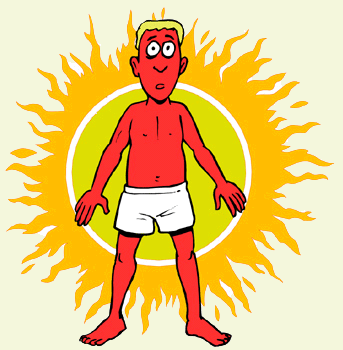Summer drug warning
Hot, sunny weather and certain meds can be a bad mix
 You know the sun can give you a nasty sunburn and even cause heatstroke if you’re not careful. But you might not know that taking certain medications puts you even more at risk. Some drugs can make your skin extra sensitive to sunlight, making you more vulnerable to sunburn and heat rashes. Others can lessen your thirst or prompt you to sweat less, upping the chances you might develop heatstroke.
You know the sun can give you a nasty sunburn and even cause heatstroke if you’re not careful. But you might not know that taking certain medications puts you even more at risk. Some drugs can make your skin extra sensitive to sunlight, making you more vulnerable to sunburn and heat rashes. Others can lessen your thirst or prompt you to sweat less, upping the chances you might develop heatstroke.
• Pop pills at night, if possible. That puts less of the drug in your system during the hot daylight hours.
• Watch for overheating. Signs include headache, light-headedness, nausea, weakness, and rapid breathing or pulse. If symptoms strike, like down and elevate your feet. Cool off with a fan and a wet cloth. Every 15 minutes, drink a half cup of water, a sports drink, or 1 teaspoon of salt in 1 quart of water. If you’re with someone who faints or is confused or feverish, call 911.
• Drink up. Chug more water or juice (but not booze, which can dehydrate you quickly!) – even if you’re not thirsty. Avoiding dehydration is important for preventing heatstroke.
• Avoid the hottest hours. During the midday heat, find a nice spot out of the sun.
• Take it easy. Don’t work out or work strenuously when it’s sweltering.
• Cover up. Wear sunscreen plus a wide-brimmed hat and sun-smart clothing: tightly woven, long-sleeved tops and bottoms. Choose lightweight cotton fabrics that help keep you cool.
Drug use
• Acne and aging skin – Benzoyl peroxide (Neutrogena Clear Pore Cleanser/Mask, PanOxyl), salicylic acid (Clearasil StayClear Daily Pore Cleansing Pads, Stridex Maximum), and tretinoin (Renova, Retin-A)
• Allergies – Diphenhydramine (Benadryl Allergy) and promethazine (Phenergan)
• Bacterial infections – Fluoroquinolone antibiotics such as ciprofloxacin (Cipro) and gemifloxacin (Factive). Tetracycline antibiotics such as demeclocycline (Declomycin) and doxycycline (Doryx, Vibramycin)
• Depression – Tricyclic antidepressants such as amitriptyline and imipramine (Tofranil)
• Diabetes – Chlorpropamide (Diabinese)
• Heart arrhythmia – Amiodarone (Cordarone) and quindine
• High blood pressure – Thiazide diuretics such as chlorothiazide (Diuril) and hydrochlorothiazide (HydroDiuril). ACE inhibitors such as benazepril (Lotensin), captopril (Capoten), and enalapril (Vasotec). Angiotensin II receptor antagonists such as losartan (Cozaar) and valsartan (Diovan).
• Irritable bowel syndrome – Dicyclomine (Bentyl)
• Nausea and vomiting – Prochlorperazine (Compro)
• Overactive bladder – Anticholinergics such as oxybutynin (Ditropan), solifenacin (Vesicare), and trospium (Sanctura)
• Pain and fever – Nonsteroidal anti-inflammatory drugs such as ibuprofen (Advil), Motrin, and naproxen (Aleve, Naprosyn)
• Parkinson’s disease – Dopamine agonists such as pramipexole (Mirapex) and ropinirole (Requip)
• Psoriasis – Methoxsalen (8-Mop, Oxysoralen)
• Psychiatric disorders – Atypical antipsychotics such as olanzapine (Zyprexa) and risperidone (Risperdal). Coventional antipsychotics such as thioridazine and trifluoperazine
• Stomach ulcer – Glycopyrrolate (Robinul)

